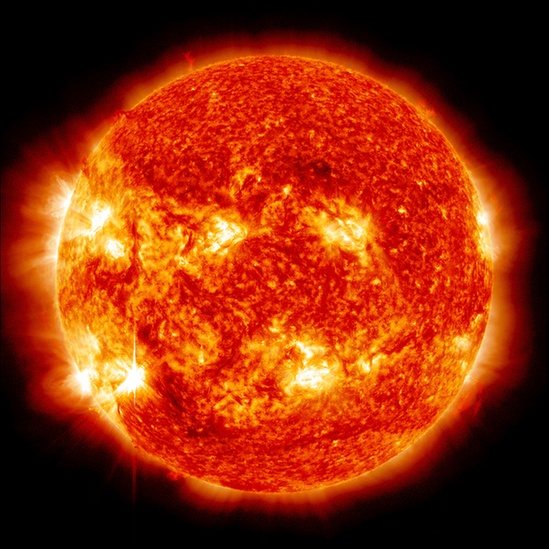當(dāng)前位置: Language Tips> 雙語新聞
Why don't we shoot garbage into the Sun?
分享到

On BBC Radio 4, Drs Adam Rutherford and Hannah Fry have been answering intriguing scientific questions from listeners and the BBC Future audience.
在BBC廣播4頻道,廣播聽眾和BBC《未來》欄目的觀眾就一些有趣的科學(xué)問題進(jìn)行提問,亞當(dāng)·盧瑟福博士和漢娜·弗萊博士給予相應(yīng)的回答。
One vexing query the pair have been exploring rocketed in from Elisabeth Hill, via BBC Future’s Facebook page, who asked:“Could we shoot garbage into the Sun?”
伊麗莎白·伊爾在BBC《未來》欄目的臉書主頁上問了一個困擾她的問題:“我們可以把垃圾扔到太陽上嗎?”兩位主持人對這個問題進(jìn)行了探討。
Fair question. After all, if we can detect gravitational waves, or send a probe to land on a comet, surely we can send some rubbish to our nearest star?
這是個不錯的問題。畢竟,如果我們能探測到引力波,能發(fā)送探測器到彗星上,那我們?yōu)槭裁淳筒荒軐⒗偷诫x我們最近的星球上去呢?
Though as Rutherford and Fry discovered in the radio episode, it’s not so simple:
不過,正如盧瑟福和弗萊在廣播節(jié)目中為我們解釋的那樣,事實(shí)并沒有這么簡單:
The primary problem is weight. The average person in the UK produces 1.85kg of waste per day; in the US, it’s 2.3kg.
主要的問題在于重量。在英國,平均每人每天會制造1.85千克垃圾;在美國,每人每天制造2.3千克垃圾。
As Andrew Pontzen of University College London points out, it costs $200m to get the Ariane V rocket into an orbit ready to travel further into space. With a payload of approximately 7,000kg, that works out at around $41,000 per kilogram. A hefty price to pay for a few plastic wrappers and a bottle or two.
英國倫敦大學(xué)學(xué)院的安德魯·波岑指出,將亞利安五號運(yùn)載火箭發(fā)送至預(yù)備軌道需要花費(fèi)2億美元。火箭可裝載垃圾約7噸,折合每千克運(yùn)載費(fèi)用約4.1萬美元。對于塑料垃圾和破瓶爛罐來說,這樣的費(fèi)用太高昂了。
In the coming decade, commercial operations like SpaceX hope to make cheaper rockets – closer to $90m per launch – and in the far future, space elevators might be an option too.
未來十年,太空探索技術(shù)公司等商業(yè)運(yùn)載機(jī)構(gòu)有望制造出更便宜的火箭,每次發(fā)射花費(fèi)或限于9000萬美元。并且,在遙遠(yuǎn)的未來,太空電梯也有可能實(shí)現(xiàn)。
But even then, the Sun is 93 million miles away, and you’d still need an enormous amount of (expensive) fuel to get the rocket to plummet into the Sun if you took the direct route. Pontzen reckons that, unless you plan the mission very carefully, you’d need about 10 times more energy for the trip between Earth and the Sun’s surface than you’d already spent getting into orbit.
但即使到那時,如果想要火箭直抵太陽,仍然需要燃燒大量昂貴的燃料,因?yàn)樘栯x地球有9300萬英里遠(yuǎn)。波岑認(rèn)為,除非你將飛行線路計(jì)劃得十分周密,否則從地球到太陽表面需要的能量,約為從地球到軌道的10倍。
So, theoretically possible? Yes. But realistically desirable? Probably not.
所以,理論上有可能嗎?有。但實(shí)際可行嗎?不太可行。
英文來源:BBC
譯者:Jogible
審校&編輯:杜娟
上一篇 : 發(fā)改委主任:中國不會出現(xiàn)第二次下崗潮
下一篇 : 她們定義了中國女性
分享到
關(guān)注和訂閱


關(guān)于我們 | 聯(lián)系方式 | 招聘信息
電話:8610-84883645
傳真:8610-84883500
Email: languagetips@chinadaily.com.cn